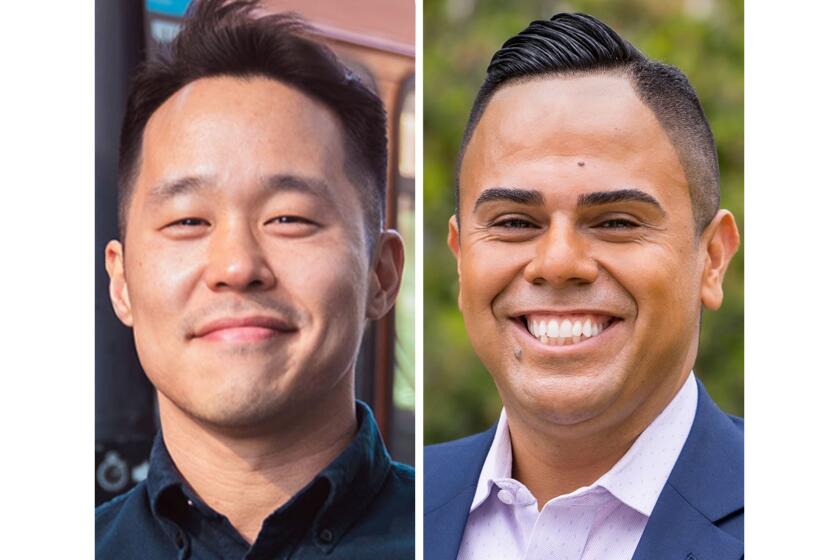Latino Los Angeles gets a place at the table
The stories coming out of last week’s White House state dinner honoring Mexican President Felipe Calderon focused chiefly on who wasn’t there. This time there were no gate-crashers, as there were at the Obamas’ only other state dinner (for Indian Prime Minister Manmohan Singh) in November.
But the bigger story, at least from the perspective of Los Angeles, was who did get a chair at the table. The guest list signaled not only that Los Angeles continues to be the de facto capital of the Latino United States, but also that the city’s labor-Latino alliance remains a dominant force (if not the dominant force) in L.A. and California politics.
Consider, for starters, who was seated at the head table with the two presidents. There was Maria Elena Durazo, who, as leader of the L.A. County Federation of Labor, runs the biggest, most effective political operation not just in California’s Latino community but in the American labor movement. (And it didn’t hurt that Durazo, acting on her own, endorsed candidate Obama before the national AFL-CIO did.)
There was Dolores Huerta, who nearly 50 years ago co-founded the United Farm Workers with Cesar Chavez. There was John A. Perez, the California Assembly speaker from a downtown L.A. district, who just two years ago was the political director of the United Food and Commercial Workers — the supermarket clerks union — in Los Angeles. There was David Lizarraga, the longtime head of TELACU, the sprawling, East L.A.-based community development corporation that was founded at the initiative of the United Auto Workers in the aftermath of the 1965 Watts riots.
Scattered around the room were Hilda Solis, President Obama’s secretary of Labor and, before that, a member of Congress from the San Gabriel Valley; Xavier Becerra, the congressman from downtown L.A. and a member of the powerful House Ways and Means Committee; Eliseo Medina, the Oxnard-based executive vice president of the Service Employees International Union and the labor movement’s leading advocate for immigrant rights; Arturo Vargas, who heads the National Assn. of Latino Elected and Appointed Officials out of its L.A. headquarters; La Opinion Publisher Monica Lozano; L.A.-based entertainers Eva Longoria-Parker and George Lopez; and, of course, onetime union organizer and now L.A. Mayor Antonio Villaraigosa.
There were, to be sure, a Latino Cabinet member (Interior Secretary Ken Salazar), and Latino elected officials, business leaders and celebrities from other parts of the country. There were also a couple of non-Latino Los Angeles Democratic rainmakers (Andy Spahn, who is Steven Spielberg’s political consigliere, and John Emerson, a former Clinton White House staffer). But among the 200-plus guests, the most heavily represented group, other than officials of the two presidents’ administrations, came from Latino Los Angeles.
This should come as no surprise. Among America’s largest cities, Los Angeles is the most heavily Latino. It’s the one where the union movement has been largely Latino-led since the late Miguel Contreras became head of the L.A. County Federation of Labor in 1996, and where such heavily immigrant locals as the janitors and the hotel workers have helped shape the larger labor movement. It’s the one where the unions (spearheaded by the L.A. County Federation and by Medina’s SEIU) have funneled vast resources into campaigns to naturalize, register and get out the vote of immigrant Latinos, turning California from a purple to a blue state and turning Los Angeles into a laboratory for such progressive economic ideas as the municipal living wage, and a launching pad for the careers of such liberal Democrats as Solis, Perez and Villaraigosa.
California is, in short, the one political terrain in the United States where new Americans from Mexico and Central America have attained real political power, virtually all of it in the Democratic Party. (Indeed, when President George W. Bush held a state dinner for Mexican President Vicente Fox in 2001, only one Latino California politician was invited — Republican Abel Maldonado.)
For these very reasons, however, it’s also a political terrain that is increasingly displeased with Obama’s reluctance to push immigration reform through Congress, even as his administration steps up efforts to deport undocumented immigrants. Latino outrage over Arizona’s new, draconian immigration law, and the Republicans’ support for it, almost certainly will ensure high Latino turnout for Democratic candidates in this fall’s California elections.
But growing exasperation with Obama’s deportation policy, even as he refuses to press for a national resolution to the immigration conundrum, tests the allegiance of his staunchest Latino supporters. Durazo, after all, has led a cross-country bus caravan to support immigrant rights, while Medina has persuaded the SEIU to help fund and organize some of the largest pro-immigrant demonstrations of recent years. Yes, they understand the president’s political constraints, but their own union members are among the deportees.
The ascent of Latino Los Angeles is an established fact. Its challenge is to bring the rest of the country to see things — most particularly, the cause of undocumented immigrants — its way.
Harold Meyerson is editor at large of the American Prospect and an op-ed columnist for the Washington Post.
More to Read
Get the L.A. Times Politics newsletter
Deeply reported insights into legislation, politics and policy from Sacramento, Washington and beyond. In your inbox three times per week.
You may occasionally receive promotional content from the Los Angeles Times.










